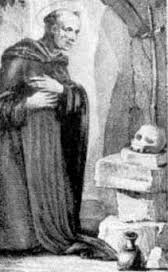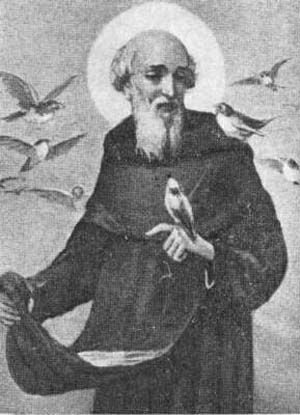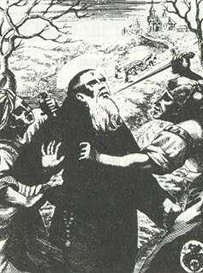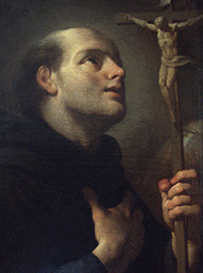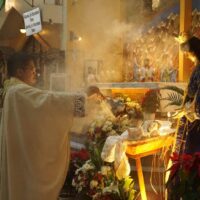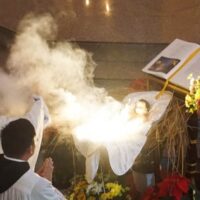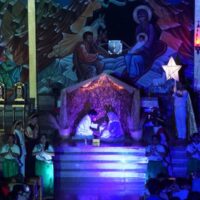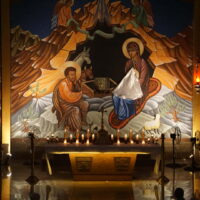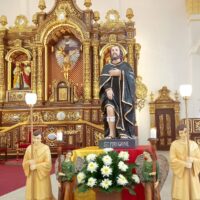 Bonaventure was born at Forlì about 1410. He entered the Order of Servants and became a Master of Theology.
Bonaventure was born at Forlì about 1410. He entered the Order of Servants and became a Master of Theology.
In his preaching he was note for his courage and his wisdom. He held many positions within the Order and was known for his prudence.
He lived a life of penance, loved solitude and fostered the regular observance. He died at Udine in 1491.
Pope Pius X approved the devotion to Bonaventure in 1911.
Mighty in word, exemplary in deed
Bonaventure of Forli was born about 1410 and entered the Order of Servants of Mary in his native city. In 1448 he was sent to Venice where for six years he diligently pursued studies in sacred doctrine and received the degree of master of theology. In the priory at Venice he probably lived with Blessed Bartholomew, a man of exceeding holiness who was known for his love of the solitary life and his distinguished work of preaching the gospel.
Bonaventure zealously performed the ministry of proclamation of God’s word. Indeed, many documents attest to his numerous and popular sermons especially during Lent in places such as Venice, Florence, Bologna, Brescia and Perugia. It is almost as if he were trying to emulate the apostle Paul.
Fra Filippo Albrizzi fittingly wrote of Bonaventure that “he was mighty in word and both admirable and venerable in example and deed.” His sermons in the plague-ridden city of Perugia merit special mention. There he convinced the people not only to implore God’s help by means of prayer and penance, but also to take an active part in the care of the poor and the sick. The fame of [his man of God was so widespread that Pope Sixtus IV named him Preacher Apostolic with the faculty to preach everywhere.
Bonaventure performed many tasks in the Servite Order. He is credited with the foundations in Piobbico in the region of Urbino and in Forlimpopoli in the district of Romagna. When he lived in Rome he was elected prior of San Marcello. It also seems he was procurator general in charge of handling affairs of the Order with the Apostolic See. In time Bonaventure desired to devote himself more fully to a life of penance and contemplation, so he petitioned Pope Sixtus IV for permission to observe the eremitical life. The pope acted favorably on his request and in 1483 permitted him and six companions to withdraw to a solitary place. It is not known where Bonaventure went, but several seventeenth century documents suggest that he may have spent some time on Monte Senario. In any case he was not there long but returned to community life out of either love or obedience. He then became prior provincial of the Province of Romagna, fostering religious discipline.
When the prior general, Antonio Alabanti, sought to return the Order to a stricter discipline, he made use of Bonaventure’s advice and assistance. A serious dispute had arisen between the prior general and the friars of the Observance in 1487, and Bonaventure was entrusted with the task of settling the disturbance and restoring peace. The following year he was elected vicar general at the chapter of the Congregation of the Observance and was later confirmed in this office by the general chapter of the Order.
Several Servite writers were familiar with Bonaventure and they point to his love for penitential acts and solitude. Fra Filippo Albrizzi wrote of Bonaventure: “He was short of stature and slight of frame, but there was no mediocrity in his learning. He was a priest of great holiness. His beard was unkempt; his feet were bare, suffering the heat of summer and the freezing cold of winter. He never wore shoes and his feet were often seen to be bleeding. He despised vanity in dress; he never ate meat or drank wine; he slept on the bare floor or on a bed of wooden planks. In short, he did whatever seemed necessary to subdue the flesh. Even while living he obtained many miracles from God as a result of his prayers.” Much the same was said of him in the poetic writings of Fra Gasparino Borro.
In 1491, after delivering the Lenten sermons in the cathedral of Udine, Bonaventure collapsed, consumed by old age and broken by the austerity of his life and labors. He died on Holy Thursday, the feast of the Lord’s Supper.
His body was at first placed in the church of Santa Maria delle Grazie in Udine. When Andrea Loredan, who was the legate of the Venetian Republic to Udine became gravely ill, he sought the intercession of Blessed Bonaventure and was fully restored to health. In 1509 he returned to his native region and, in thanksgiving for his cure, he had Bonaventure’s body transferred to Venice and placed in the Church of Saint Mary of the Servants.
In 1911 the Sacred Congregation of Rites ratified the devotion to Blessed Bonaventure. After much effort his remains were. returned in 1971 to the Church of Santa Maria delle Grazie.
Prayer
Touch our hearts, O Lord, with the same spirit of conversion with which you touched your servant Blessed Bonaventure and made him both a herald of your gospel and an example of penance. We ask through our Lord Jesus Christ.
 Diocese of Parañaque
Diocese of Parañaque

